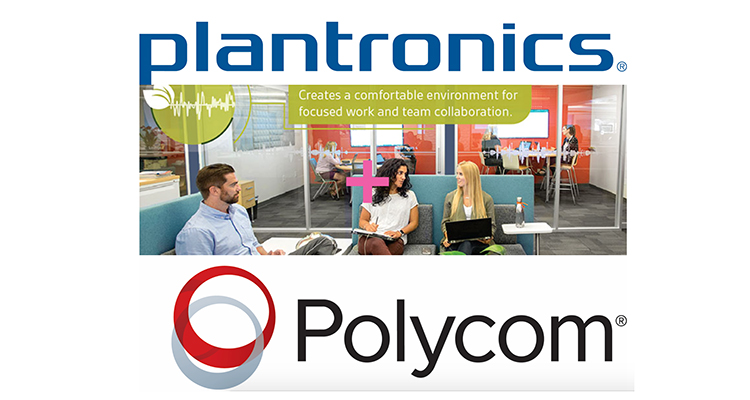Did Plantronics Bail Out Polycom or Is This Perfect Timing?
 As the rest of the advertiser-supported AV press just reprints the Polycom or Plantronics press releases, we’re going to call it how we see it — with the truth about this “acquisition.”
As the rest of the advertiser-supported AV press just reprints the Polycom or Plantronics press releases, we’re going to call it how we see it — with the truth about this “acquisition.”
Yes, Plantronics is taking control of Polycom — a history-making videoconferencing company that all but invented the space — for what amounts to $2.0 billion in enterprise value, but the financial breakdown of the deal is this:
- Plantronics assumes about $690 Million of Polycom debt.
- They pay about $948 in cash and 6.4 million Plantronics shares (that’s valued at $362 Million the moment the deal was announced yesterday).
- Polycom shareholders end up owning about 16 percent of Plantronics
The transaction has been unanimously approved by the boards of directors of both companies, is subject to regulatory approvals and other customary closing conditions, and is expected to close by the end of the third calendar quarter of 2018. Polycom is privately held and for CY2017, Polycom had GAAP revenue of $1.1 billion, Non-GAAP gross margin of 56.6 percent, Non-GAAP operating income of $183.1 million and Non-GAAP operating margin of 16.0 percent.
But, who wins and who loses in this deal?
Well, to be frank, this could be one of those win-win deals in a few different ways. First off, Plantronics has been begging to be noticed in the commercial AV space ever since debuting its Habitat Soundscaping sound-masking environment last year. It’s garnered a lot of popular press and some nods from the integration community (and they’ve paid for a few awards) but it hasn’t yet taken hold in a big way. The system is truly unique and one of the most creative products we’ve seen in years. It should sell but it’s a bit complicated to pitch as it’s not simply sound masking.
Simultaneously, companies like Zoom and products like Skype for Business have been eating Polycom’s lunch when it comes to conferencing and collaboration. To combat this, Polycom even partnered with Zoom back in 2017 but in reality, most people use Zoom as a stand-alone product/service. Zoom is currently valued (remember, it’s private) in excess of $2 Billion by many financial analysts. Zoom has publicly stated it’s in 90 percent of the top-200 US-based universities and that more than 50 percent of the Fortune 50 companies primarily use Zoom.
So, this is the perfect time for Plantronics to buy Polycom. Plantronics needs distribution in the commercial AV market and Polycom needs both a tech and financial boost if it wants to eventually compete with the likes of Skype, Zoom and even Cisco’s Spark platform. Plus, as an added bonus, Plantronics has key contacts inside the IT world of the Fortune 1000 via nearly unanimous adoption of its phone headset market — it has well in excess of a 90 percent market share there. Polycom could benefit selling its hardware-based systems into that already-developed market owned by Plantronics.
In the public statement yesterday after the acquisition announcement, Plantronics said that Polycom “brings a global leadership position in voice and video collaboration, accelerating Plantronics vision of delivering new communications and collaboration experiences.” This is absolutely true. Polycom has some of the best people in AV and its brand is like the “Kleenex” of the VTC market.
This will help Plantronics ease Habitat Soundscaping in to the ProAV market — or, at the very least, get noticed.
Polycom is a provider of communications and collaboration technologies. Polycom is privately held and has been an innovator in personal collaboration, group collaboration, and services (including customer care, managed and professional services, and cloud services for interoperability, management, and analytics). For CY2017, Polycom had GAAP revenue of $1.1 billion, Non-GAAP gross margin of 56.6 percent, Non-GAAP operating income of $183.1 million and Non-GAAP operating margin of 16.0 percent. Significantly Enhances Plantronics Long-Term Shareholder Value
The transaction is expected to be immediately accretive to Non-GAAP EPS. Plantronics targets achieving annual run-rate cost synergies of $75 million within 12 months of transaction close.
Plantronics intends to fund the cash portion of the consideration with cash on hand and approximately $1.375 billion in new, fully-committed debt financing. Wells Fargo Bank and affiliates have committed to provide the debt financing for the transaction, subject to customary conditions. Plantronics expects to pay down a significant portion of the debt within the next several years with cash on the balance sheet and through cash generation.
Plantronics is here and Polycom is here.




